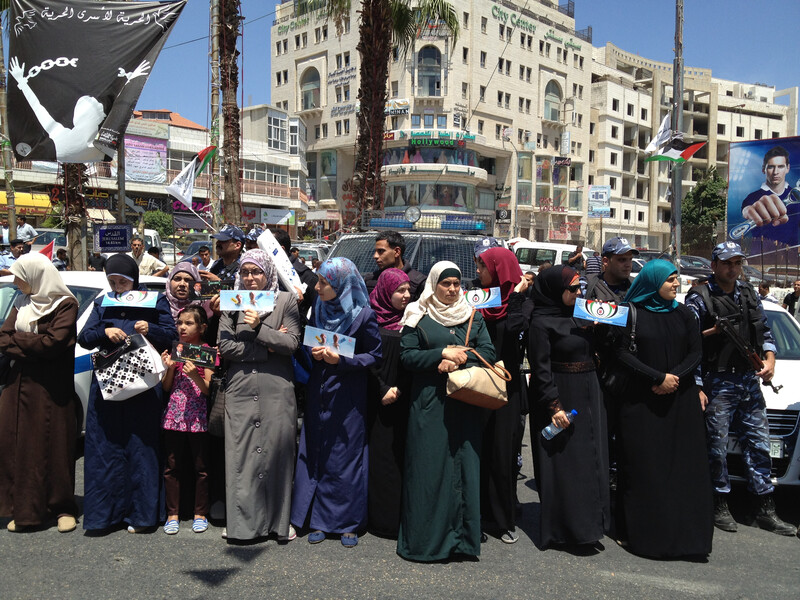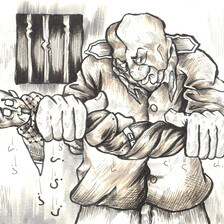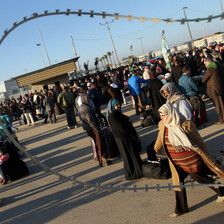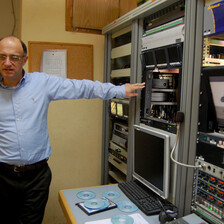The Electronic Intifada Ramallah 12 June 2014

Palestinian forces in the West Bank and Gaza perpetrated more than 500 documented media freedoms violations since between 2007 and 2013, according to monitoring group.
APA imagesSipping a cup of coffee and lighting a cigarette in his office in the occupied West Bank city of Ramallah, independent journalist Mohamed Jaradat described the Fatah-led Palestinian Authority’s treatment of dissenting Palestinian journalists as increasingly oppressive and violent.
Jaradat, who has spent the last nine years doing production work for international media, has been detained and beaten by Palestinian security forces on several occasions.
“It is shameful that they call this the ‘State of Palestine,’” he told The Electronic Intifada. Referring to the Palestinian Authority and Fatah party leader, he said, “This is the police state of Mahmoud Abbas.”
Approximately a dozen women gathered on Wednesday, 11 June in Ramallah’s Manara square to protest against the Palestinian Authority’s politically-motivated arrests of Hamas activists. Security forces, including civilian-clothed police officers, responded by beating and arresting several demonstrators and journalists, as was televised by Wattan TV.
The Palestinian Authority’s security forces, which cooperate extensively with Israel’s occupation army, have earned a reputation in recent years for attacking journalists.
Referring to an August 2013 protest in Ramallah against negotiations with Israel, Amnesty International researcher Saleh Hijazi told The Electronic Intifada: “We even saw the Palestinian Authority wearing protective gear, such as helmets, which should be reserved for conflict zones. This is a pattern of attacks on freedom of expression for both demonstrators and journalists.”
“There’s no justice”
On Wednesday, shortly after security officers spotted Jaradat filming the attacks with his telephone from the balcony of his nearby office, four men kicked down his door.
“They came in, grabbed me from the balcony and threw me on the ground,” he recalled. “I told them I was a journalist, and one of them told me, ‘We don’t care … you can shove your press card up your ass.’”
“They took me to the police station,” he added. “There they told me they’d hit me if I spoke. They took my cell phone.”
After being detained for a while, Jaradat later noticed that pictures and messages were missing from his telephone.

The 11 June women’s protest during which Palestinian Authority police attacked journalists.
“At least from [Israel’s] occupation we know what to expect,” he commented. “But from the Palestinian Authority police you never know what they are going to do.”
When asked if he would file a complaint, Jaradat said, “It is pointless … there’s no justice.”
Meanwhile, at least another three journalists were beaten in Manara square, including Muath Amarneh and Anis Arquob.
“Any person who doesn’t stand with the Palestinian Authority can face oppression and violence,” Jaradat explained. “The idea today is that we all follow like sheep and say that Abu Mazen [Mahmoud Abbas] is the best person. It’s forbidden to criticize, to think, to speak out.”
“It’s a police state,” he said.
500 press violations
Human rights groups regularly denounce the violations of Palestinian journalists’ rights, who are both targeted with deadly force by Israel and subject to increasingly repressive measures imposed by the Palestinian Authority in the West Bank and Hamas in the Gaza Strip.
Israel, the PA and Hamas committed a combined total of more than 500 press violations in 2013 alone, as reported by the Committee to Protect Journalists earlier this year.
“The Israeli occupation military uses force and shoots us with gas or rubber-coated steel bullets, but they are attacks against whole groups,” Jaradat said. “The Palestinian Authority targets us as individuals and because of our work.”
The raid on his office was not Jaradat’s first encounter with Palestinian Authority violence. Since he made a documentary about torture in Palestinian Authority prisons in 2009, he has been repeatedly harassed.
“Preventive security took me in and asked why I was writing about the [Palestinian] Authority,” he said. “They said I crossed the red line and told me not write about the government anymore, to only write about Israel and its occupation.”
“We want to teach journalists”
During the 2012 demonstrations against former Israeli defense minister Shaul Mofaz’s visit to Ramallah, Jaradat was arrested after photographing violence by police officers dressed in civilian clothing. After being hit several times in the street, he was arrested and taken to the police station.
There he says he was tortured, including being beaten for nearly an hour straight by four officers. “The whole time I was telling them that I am a journalist,” he said. “I had even shown them my [Palestinian Authority-issued] press card.”
“One of them told me, ‘We are the police. We do what we want, and we want to teach journalists.’”
They later transferred him to Ramallah Hospital, where he spent three days under supervision and was billed 1,500 shekels (approximately $435). To date, the Palestinian Authority has not compensated him for the medical bills or for the camera they broke.

Mohamed Jaradat after he was beaten by Palestinian Authority police in 2012. (Image courtesy of Mohamed Jaradat)
Since that time, Jaradat says that friends working in the Palestinian Authority tipped him off that his journalistic work and activity on social media have been consistently monitored.
According to Amnesty International’s Saleh Hijazi, the Palestinian Authority has yet to hold anyone accountable for the assault of Jaradat or other press violations.
“PA officials, including the prime minister, say that they will hold the security forces accountable for their attacks on the press, but until now we have seen no indication of that,” Hijazi said.
Yet the journalist’s problems didn’t come solely from the Palestinian Authority. When Jaradat went to the Gaza Strip last year to film a short documentary about Israel’s suffocating coastal blockade, he was detained and interrogated by Hamas forces.
Increased violations
Press violations by Palestinian groups against Palestinians mostly reflect the seven-year conflict between Hamas and Abbas’ Fatah party, according to MADA Center for Media Freedoms and Development. As a result of the 2007 split, the two political groups committed, through 2013, more than 500 documented media freedoms violations, including arrests, interrogation, censorship, confiscation of equipment and physical violence.
Since the recent Fatah-Hamas reconciliation agreement, those violations have increased — and the Palestinian Authority and Hamas are already accused of at least fifteen violations in the first two weeks of June, according to Mousa Rimawi, the director of MADA Center.
On 6 June, outside of the Palestinian intelligence headquarters in the West Bank city of Tulkarem, security forces attacked and beat a cameraman who was covering a sit-in demonstration calling for the release of a local activist from a Palestinian jail.
Ahmad Khateeb, who works for the Hamas-affiliated Al-Quds TV, was approached by security officers who “hit him violently in the neck, chest and head,” MADA reported.
Although the protesters intervened and prevented them from arresting Khateeb, the police officers confiscated his camera.
Elsewhere, in the Gaza Strip, Wattan TV’s radio correspondent Yousef Hammad was attacked by Hamas security forces while trying to document their clashes with protesters demanding that they be allowed to access their salaries.
“The aggression left Hammad with a skull contusion and a bone fissure in his right foot,” MADA reported.
Attacks on free speech
Pointing to these numerous violations, MADA’s Rimawi explained that there is a clear pattern of attacks on free speech.
“It’s not just about what happened yesterday in al-Manara,” Rimawi told The Electronic Intifada, referring to Wednesday’s attack. “We don’t want to return to the first months following the division, a time when there were a lot of violations.”
MADA Center on Wednesday called for an immediate investigation into the assaults against journalists that day, but the Palestinian Authority has yet to respond.
“We want not just punishment for those responsible, but a sign that they will stop the violations permanently,” Rimawi said.
Journalist Mohamed Jaradat, who is moving to the United States next week, says he no longer wants to worry about his safety.
“I won’t come back to Palestine until there is no more Palestinian Authority,” he said.
Patrick O. Strickland is an independent journalist and frequent contributor to The Electronic Intifada. Find his writing at www.patrickostrickland.wordpress.com. Follow him on Twitter: @P_Strickland_
Tags
- Press Freedom
- freedom of speech
- Ramallah
- Mohamed Jaradat
- Palestinian Authority
- Hamas
- Palestinian authority police
- police brutality
- violence by Palestinian Authority forces
- Saleh Hijazi
- Amnesty International
- MADA
- reconciliation
- national unity government
- Ahmad Khateeb
- Yousef Hammad
- al-Quds TV
- Wattan TV
- Mousa Rimawi





